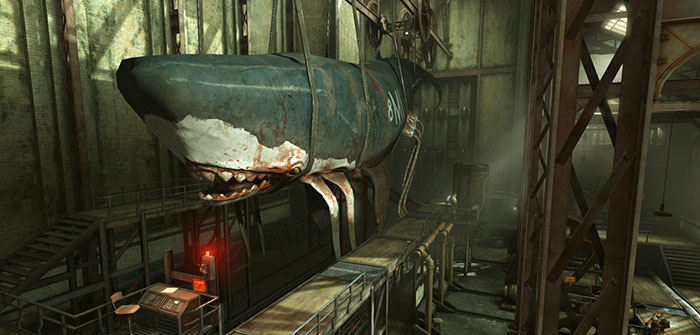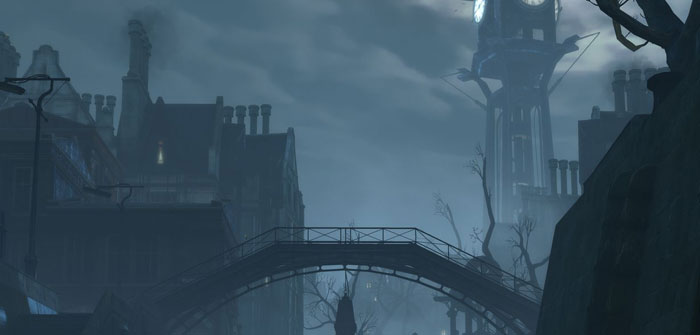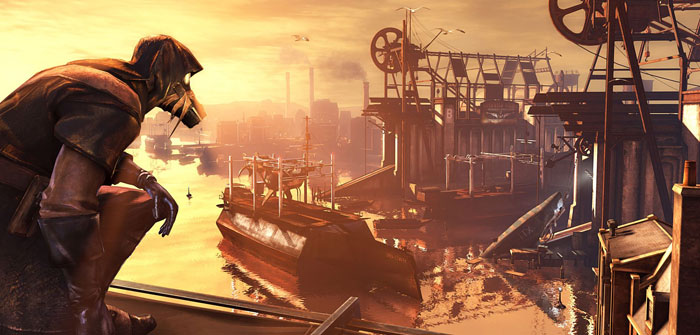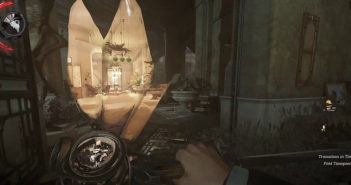The Dishonored series has been my all-consuming obsession during lockdown when I’m not working or writing.
And as I played through these games and their downloadable content, I started to notice similarities between the bleak world of Dishonored and our own amidst the coronavirus pandemic.
For those unfamiliar, Dishonored is set in the wholly original fantasy world of the Empire of the Isles; the Empire’s seat of power is the city of Dunwall. Dunwall is dark and gray and smoky—think of the city as a mashup of King’s Landing from A Song of Ice and Fire, the steampunk Central from Fullmetal Alchemist, and Eddie Campbell’s illustrated vision of Victorian England in Alan Moore’s From Hell.
The Dishonored series employs a morality system. When you behave yourself and kill as few opponents as possible, your world exists in a “low chaos” state. The world is thus calmer and more optimistic. But if you play as a bloodthirsty glutton (admittedly my strategy), you throw your world into “high chaos,” and it shows. Enemies are on edge and more aggressive, your allies treat you gruffly, and the overall world is visually darker and more dangerous.
In the first Dishonored game, Dunwall is loosing the fight against the Rat Plague, which turns its victims into “weepers”—infected citizens who loose their minds and “weep” blood as they stumble through the world mere shells of their former selves. And guess what? The more chaotic your game is, the more weepers you’ll find stumbling around. That sounds metaphorically familiar…
Also sounding familiar are the loudspeaker announcements played during the “Captain of Industry” mission of the Knife of Dunwall downloadable content (DLC) chapter. Here you play as Daud, an assassin responsible for some blood-soaked troublemaking in the main game.
In Knife of Dunwall, Daud is unraveling the mystery of a whaling ship named the Delilah, and his first stop is the Rothwild Slaughterhouse, where the whaling tycoon Bundry Rothwild holds the answers he seeks. But Bundry isn’t exactly an approachable guy—this entrepreneur is a Randian wet dream (and possibly a John Galt caricature).
Bundry Rothwild fits into fascist framework of Dishonored snugly. He views his workers as both parasites and expendable resources for churning out as much profit as possible, and he’s supported by the Lord Regent’s police state. Bundry’s enforcers throughout the slaughterhouse are the Butchers, and they’re not shy in demonstrating bloody authority if they believe a worker is misbehaving.
As the guy who wrote the book, Bigmart Confidential: Dispatches from America’s Retail Empire, I smirked at many of the aforementioned loudspeaker announcements that played during the chapter.
“Attention: Under plague conditions, failure to report for work at industries deemed vital to state interests has been declared treasonous by the Lord Regent.”
“This is a reminder that collective bargaining in any industry deemed vital to the state is a capital offense. These include metallurgy, whale collection and refinement, security services, and selected legal and clerical specializations. Consult the City Barrister for clarifications and enforcement.”
“Missing or damaged time cards will no longer be replaced, due to abuse of this indulgence. Any worker without a time card will be denied admission to the grounds and summarily terminated.”
“Any worker found trying to agitate, interfere with, or free captive livestock will be charged with treason.”
“Butcher-men, you’ll collect your bonuses at sundown in my offices. Well done, my boys. The rest of you, piss off.”
“To all striking laborers my generous offer stands. Half pay and a dozen lashes… What shall we do with a striking worker…?”
With quotes like these, I couldn’t help but think about Amazon factory workers striking due to untenable work conditions during the coronavirus pandemic.
Grocery-store and fast-food workers—people who put up with incredible amounts of bullshit because of a the customer is always right philosophy—are now deemed as “essential workers” and celebrated as heroes. But despite their heroics, dismal wages are still the norm.
There’s also Donald’s bluster and bravado over signing an executive order mandating meatpacking plants to remain open despite workers testing positive for the coronavirus.
And long before the coronavirus pandemic, don’t forget about the Pizza Hut in Florida that threatened to fire employees if they chose evacuation instead of reporting to work during Hurricane Irma.
Will these same “essential” workers—who are all wage slaves of the service industries—finally have the livable pay, sick leave, vacation time, affordable healthcare, and rights to collective bargaining they’ve always deserved?
In Bundry Rothwilds of this neoliberal world of ours continue having their way, I doubt it. This was an unfathomably corrupt problem before the coronavirus pandemic made it hip to care about the struggles of the working poor. And it will continue to be an unfathomably corrupt problem after people settle into whatever the “new normal” looks like.
During the “Captain of Industry” mission of Dishonored: The Knife of Dunwall, you can choose to side with the striking laborers and blow up the Rothwild Slaughterhouse. Rothwild and his Butchers die in the process, and this choice results in a spike of high chaos. But for me, it felt too damn good to pass up.






